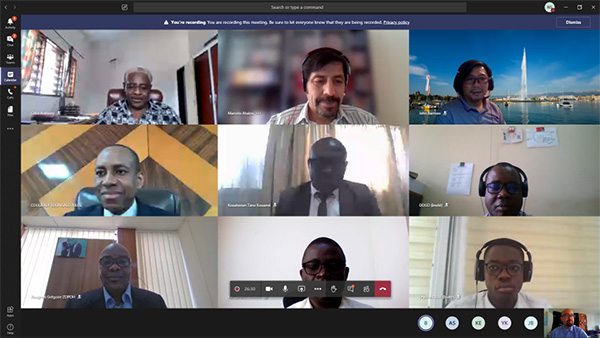DMFAS responds to countries’ need for support in debt management
The work of the Debt Management and Financial Analysis System (DMFAS) programme in 2020 was largely driven by its response to countries’ needs for support in debt management resulting from the COVID-19 crisis.
In the face of growing concern about the overall outlook for external debt sustainability in developing countries, accentuated by the COVID-19 crisis, DMFAS provided technical assistance to 58 countries for the effective recording, monitoring and reporting of public debt, and for performing debt operations.
One-third of supported countries were in Sub-Saharan Africa, one quarter in Latin America and the Caribbean and the remainder spread across the Middle East, North Africa, Asia and Europe. The majority had either low-income or lower middle-income development status, two were in debt distress and the risk of debt distress was classified as high in 12 countries.
The programme quickly adapted its support in early 2020 to respond to countries’ changing requirements as they faced the challenges of the COVID-19 crisis. Adaptations included support in capacity-building and support for recording, reporting and monitoring COVID-related debt reorganization initiatives, particularly the Debt Service Suspension Initiative.
"Uzbek DMO Back Office team had input all data related to External public and publicly guaranteed debt into the system which coincided with this difficult and unusual Covid-19 situation. The Ministry of Finance expresses its sincere gratitude for your continued practical assistance and support"Mr. Farruh Hamdamov
Head, Management of public and publicly guaranteed debt service and accounting department
DMO, Ministry of Finance, The Republic of Uzbekistan

The back office team of the Debt Management Office in Uzbekistan.
Increased online support

Participants of an online workshop on interface design with Côte d'Ivoire in June 2020.
As debt management offices moved to teleworking as a result of the pandemic, the programme provided increased online support for remote access to the DMFAS system. Remote delivery of technical support and capacity-building activities replaced traditional face-to-face training when it became impossible due to travel restrictions.
The programme was therefore able to provide developing countries with continuous support to improve their capacity to face the socio-economic challenges resulting from the COVID-19 pandemic. The programme also synergized its efforts in this sense with those of other organizations providing technical assistance in debt management.
Supported countries were generally able to ensure that debt operations continued with minimal disruption and that comprehensive, accurate and timely information on public debt was available in support of policy decisions and risk management in the context of the pandemic.
Key results of 2020
In 2020, key results included progress in debt coverage, with 95% of countries having comprehensive government and government-guaranteed external debt records and 75% reporting complete domestic debt records in DMFAS. In relation to enhanced transparency and recording, 40 countries published statistical bulletins and most of them reported to international databases managed by the World Bank.
In the area of operational risk management, 25 countries had up-to-date back-office procedures manuals, while 21 countries had disaster recovery plans covering the debt database. In relation to debt analysis, 25 countries produced debt portfolio reviews during the year.
Despite the exceptional circumstances, with the programme’s support, some countries also made progress in building interfaces between their own financial systems and the DMFAS software, with a total of 25 institutions in 21 countries having functional interfaces by the end of the year.
During the period, the programme trained, largely remotely, nearly 350 officers from 26 countries, of whom 45% were women.
Overall, the DMFAS programme contributed to strengthening countries’ capacity to record, monitor and report effectively on public debt during the crisis, which was crucial for managing the financial vulnerabilities and increased risks of debt distress faced by developing countries, particularly the poorest.
The resulting improvement in debt data transparency is critical for effective crisis management, as it helps countries effectively manage their finances and facilitates timely and appropriate international support to mitigate the crisis.


